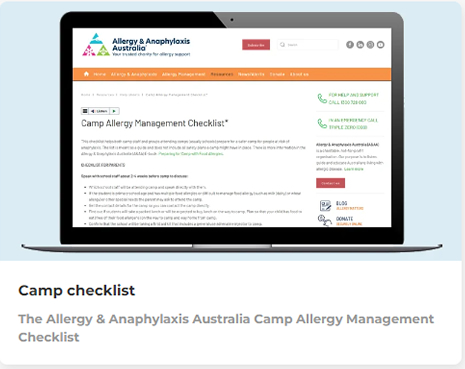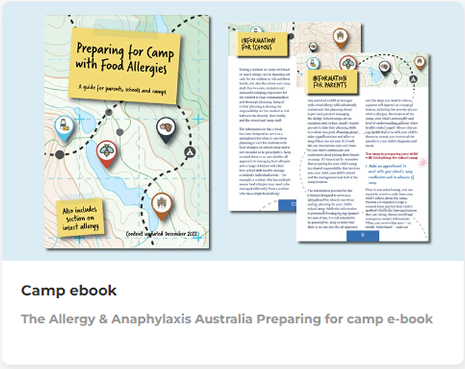When you go on camp, there are things you can do before and during camp to reduce the risk of having an allergic reaction.
Planning ahead is critical, particularly for food allergies.
1. Check your medications
-
Ensure you have two adrenaline injectors (EpiPen®s or Anapen®s) within their expiry date and your ASCIA Action Plan is current. Be prepared to carry your adrenaline injector with you while you are on camp. Discuss with the camp guides about how to safely carry these when participating in adventure activities.
-
Ensure that other medications (such as antihistamines, asthma reliever puffers) are also within expiry.
2. Contact the camp coordinator well in advance to discuss:
-
Have all staff attending the camp completed anaphylaxis training?
-
Who will be catering for the camp?
-
Are there any planned activities that involve food? It is not recommended that camp activities involve food.
-
Is it possible to provide meals and/or snacks?
-
Where will the adrenaline injectors be stored? OR alert the camp coordinator that you will be carrying your adrenaline injectors yourself during the camp. You will need to discuss how to safely carry your adrenaline injectors when participating in adventure activities.
-
What is the Emergency Response plan for the camp?
3. Speak to the camp operators in advance to discuss:
-
Have camp staff completed food allergen management anaphylaxis training?
-
How do they manage food allergies at their camp facility?
-
Is there a written procedure for managing food allergies?
-
Has the correct information about your food allergies been provided (for example, by the camp coordinator)?
-
What strategies have been put in place to reduce the risk of you being given the food you are allergic to?
-
Is it possible to remove peanuts and tree nuts from the menu while you are on camp, if you are allergic to these foods?
-
Are there any off-site activities planned and how will allergies be managed when off-site?
-
Does the campsite have a written emergency response plan for anaphylaxis?
-
Can emergency care (such as an ambulance) access the camp and how far away is the nearest ambulance service and hospital?
4. Speak to the chef/cook at the camp at least 2 weeks in advance. This will give them enough time to plan and order food. Ask them:
-
Have the staff who prepare and serve food completed the All about Allergens for Camps online training?
-
What strategies do they have in place to make sure campers with food allergies are given appropriate meals?
-
How do they reduce the risk of cross contamination with food allergens?
-
Request a copy of the camp menu and discuss suitable alternatives where appropriate.
-
How is food served to campers? Is there any buffet service and if so, is this supervised by the catering staff? Can your food be served first?
-
Is there a specific catering staff member who attends to those with food allergies and other dietary needs?
-
What storage facilities are available for meals brought from home? How do catering staff handle the re-heating and serving of these meals if provided?
If you are concerned about the ability of the camp to provide appropriate meals (particularly you have multiple allergies), consider providing your own meals. Often the main meals can be catered for, but snacks or wheat (or milk or soy) free bread may need to be provided, depending on the food allergies being managed.
If you provide your own meals:
-
Make sure you provide the meals in sealed containers clearly labelled with your name.
-
If you are providing snack foods, make sure the packaging is unopened or if open, placed in a sealed container. Snack foods should also be clearly labelled with your name.
5. While you are on camp:
-
Carry your adrenaline injectors with you at all times while you are on camp.
-
Take appropriate snacks for yourself. Don’t accept snacks from other people on camp in case they contain your allergen, or have been cross contaminated with your allergen.
-
Read labels of any pre-packaged foods — don’t take risks with foods that say they “may contain” your allergen.
-
Make sure you get the right meal. Tell the catering staff what you are allergic too every time you eat. Always speak clearly when getting your meal saying exactly what allergy you have. If you are not sure about the food, ask about the ingredients.
-
Don’t share someone else’s meal or ask for a “regular” meal instead of your allergen-free meal. If you are still hungry after eating your meal, speak with camp staff, do not be tempted to eat someone’s left overs.
- If you experience symptoms of an allergic reaction, lie down on the ground and tell the anaphylaxis trained staff straight away that you are having an allergic reaction. Follow the instructions on your ASCIA Action Plan.
For more information
Allergy & Anaphylaxis Australia’s camp checklist
Allergy & Anaphylaxis Australia’s Preparing for camp e-book is available for download here
Content created May 2024.


